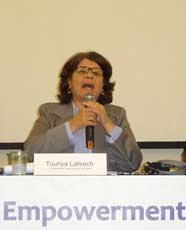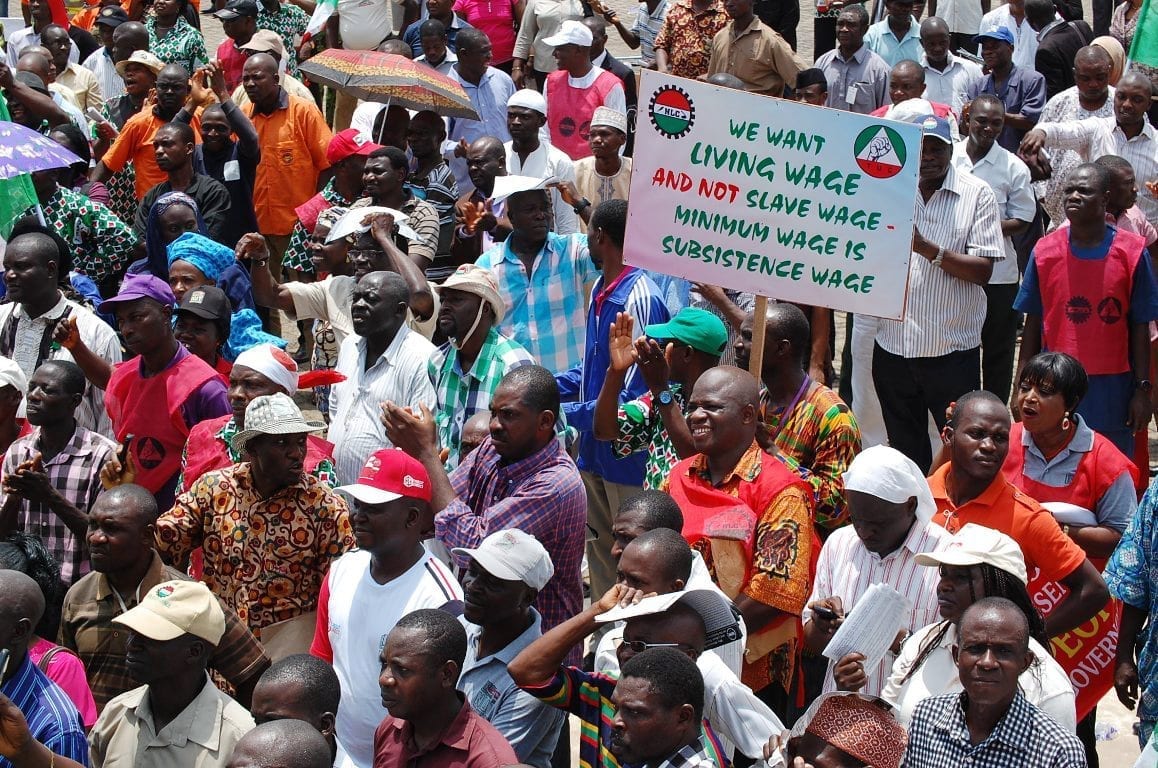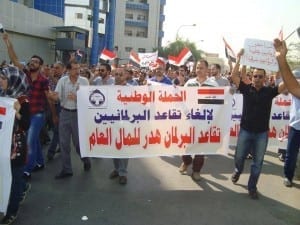Sep 27, 2013

Morocco union leader Touriya Lahrech will join women unionists at a gender equality conference in Casablanca. Credit Tula Connell/Solidarity Center
Nearly two dozen women trade unionists from Algeria, Egypt, Jordan, Tunisia and Palestine are set to meet next week for a unique skills-building and strategy conference in Casablanca, Morocco.
The Solidarity Center-sponsored Women’s Regional Advocacy Conference for the Middle East and North Africa region will bring together women leaders from seven union bodies to hone concrete skills, such as communications outreach and message development, and to support union-building initiatives that women leaders have identified as most important. Women representing the gamut of workers—from public sector employees to those toiling on farms—will share and learn strategies for strengthening women’s voices in their unions, their workplaces and in society.
The Sept. 30–Oct 1 conference continues the Solidarity Center’s series of trainings with union partners around the world. The Solidarity Center is committed to helping train women activists to become more effective advocates for gender equality at the bargaining table and within union structures.
In July, the Solidarity Center hosted more than 100 labor and community activists from 20 countries for the two-day conference, “Women’s Empowerment, Gender Equality and Labor Rights: Transforming the Terrain.” Touriya Lahrech was among those taking part, and she will welcome participants to the Casablanca conference. Lahrech is coordinator of the Women’s Department at the Confederation Democratique du Travail in Morocco.
Participating union bodies include: the Egyptian Democratic Labor Congress (EDLC); the Egyptian Federation of Independent Trade Unions (EFITU); the Federation of Independent Trade Unions of Jordan (FITU); the Palestinian General Federation of Trade Unions (PGFTU); Algeria’s SNAPAP; and the Union Générale Tunisienne de Travail (UGTT).
Sep 23, 2013
The number of child laborers has declined by one-third globally, from 246 million in 2000 to 168 million in 2012, according to an International Labor Organization (ILO) report released today. Yet the report also shows that despite the reduction, the worst forms of child labor will not be eliminated by 2016, a goal sought by the ILO and its international allies.
“Marking Progress against Child Labor,” published in advance of the Global Conference on Child Labor in Brazil next month, shows child labor among girls fell by 40 percent since 2000, compared with a 25 percent decrease for boys. Other findings:
• The largest absolute number of child laborers is in the Asia-Pacific region (nearly 78 million), but the percentage of child laborers per population is highest in sub-Saharan Africa countries, at more than 21 percent.
• The number of children in hazardous work declined by 30 million, from 115 million to 85 million, between 2000 and 2012. Hazardous work by children is often treated as a proxy for the worst forms of child labor and include any activity or occupation that leads to adverse effects on the child’s safety, health and moral development.
• Agriculture remains by far the largest sector with child laborers (98 million children, or 59 percent). But there also are large numbers of child laborers in services (54 million) and industry (12 million), primarily in the informal economy.
The 168 million child laborers represent 11 percent of the world’s child population. Human Rights Watch Advocacy Director Jo Becker put the new data in perspective: “While the progress is encouraging, the number of children still engaged in child labor is staggering.”
The report attributes the overall decrease in child labor, which occurred during the global recession, in part to “policy choices and accompanying investments that have been made in education and social protection.”
The ILO report warns against complacency in the face of such progress, recommending continued efforts in passing legislation and enforcement mechanisms covering minimum age and accessible and relevant education and skills development, social protection floors and expanded decent work opportunities for youth above the minimum age for admission to employment.
In seeking to eliminate child labor around the world, the Solidarity Center frequently partners with unions, which play a key role in eliminating child labor. The economic benefits of trade unions in the workplace often enable adult workers to support their families without sending their children to work. Further, a union presence generally prevents employers from exploiting children. Unions also can improve livelihoods through collective bargaining agreements.
You can join a virtual march against child labor in conjunction with the Oct. 8–10 global conference in Brazil via a free app on Facebook. The application enables users to learn more about child labor and “walk” together toward a free world from child labor.

Sep 20, 2013
Carrying signs reading, “Minimum Living Wage, Not Slave Wage,” Nigerian workers peacefully marched this week to protest a proposal to remove the Parliament’s ability to legislate wage, labor and pension issues by making such rulemaking the purview of 37 different states. The plan, which would amend the 1999 Constitution, would eliminate a national minimum wage by allowing states to set their own.
The country’s two major labor federations, the Nigerian Labor Congress (NLC) and the Trade Union Congress (TUC), say the proposal negates the principle of collective bargaining and runs contrary to International Labor Organization (ILO) Convention 131 on the minimum wage. Amending the Constitution, they say, would mean 85 million Nigerian men and women will work in precarious, deregulated and unprotected conditions.
The TUC said the point of a national minimum wage “is to ensure that employees, particularly the unorganized and unskilled, are not exploited by their employers to the extent that their pay becomes so low” that people are impoverished. The minimum wage is “not a living wage. As such it guarantees a mere bare existence for workers in the formal sector—public and private. It also influences wages in the informal sector, thus minimum wage, as approved to salary increase, affects all.”
Protesters rallied on Wednesday at the NLC Labor House in Abuja, the capital, before marching to the National Assembly Complex to submit a protest letter to the Senate leadership. There, Senate President David Mark told them that the National Assembly’s conference committee would register their concerns when it begins to reconcile draft bills from both chambers.
Sep 18, 2013
Independent and credible institutions in Zimbabwe, in particular its main union federation, have a fundamental role to play in any effort to improve the country’s yawning social and economic needs, testified the Solidarity Center’s Imani Countess before a recent U.S. House of Representatives subcommittee hearing.
Countess, Solidarity Center Africa regional program director, served as one of two expert witnesses at the September 12 hearing “The Troubling Path Ahead for U.S.-Zimbabwe Relations,” called by the House Subcommittee on Africa, Global Health, Global Human Rights and International Organizations.
On the heels of Zimbabwe’s contested elections, which returned Robert Mugabe to the presidency, the country’s workers and economy face a continued uphill struggle. However, while political intimidation has silenced many, trade unions and their partners have created space for independent action and dialogue—and should be supported.
The Zimbabwe Congress of Trade Unions (ZCTU), the largest and most vocal civil-society organizations in the country, has worked to push a pro-poor economic agenda and is best poised to help the country rebuild a foundation for a strong middle class, she said.
“Without a revived jobs base, the government cannot effectively make the investments needed to revive the country’s economic infrastructure or its education system to meet the needs of an economy integrated into the regional or global marketplace,” said Countess, adding that, “Zimbabwe clearly needs an economic plan and a trade plan that prioritizes investment in industrialization and jobs-led growth. Africa’s trade unions have emphasized the need for accelerating industrialization in Africa. They recognize that the current model of growth based largely on the export of raw extractive minerals fosters dependency on Western and Asian markets, which leaves the continent exposed to numerous economic shocks and perpetuates the pattern of jobless growth—leaving Africa less stable and less secure.”
As the newly elected government in Zimbabwe has choices, so too, does the United States, said Countess. “The U.S. government has a variety of tools at its disposal that can be used to support rule of law and human and worker rights in Zimbabwe and to encourage the government of Zimbabwe to do the same. These investments in Zimbabwe’s citizens and their institutions can produce positive outcomes by leveling the playing field in ways that can lead to a more stable economy and one that ultimately provides benefits for all.”
Read her full testimony.
Sep 18, 2013

Iraqi workers are demanding better wages and working and living conditions. Credit: Shamkhi Jabour
Iraqi workers and their unions recently took part in nationwide protests to demand better wages and working conditions and improvements in essential services, such as electricity and infrastructure. The General Federation of Iraqi Workers (GFIW) also demanded an end to the exorbitant salaries and pension benefits of government officials, whose compensation offers a sharp contrast with that of millions of workers, who are paid wages so low they cannot support themselves and their families. Workers and their unions say they want a fairer salary scale and increased pensions and social insurance.
When workers took to the streets across Iraq August 31, in some areas, like Nasseryya in the south, governmental security forces and anti-riot police used live bullets to disperse the crowd. In Baghdad, security forces used stun grenades and water cannons on demonstrators and closed roads to prevent people from joining in protest against the Iraq Parliament. Security forces arrested four wounded protestors while they were receiving treatment in the hospital.
Government paralysis, stalled infrastructure improvements and a deteriorating economy have worsened the living and working conditions of most Iraqis. The independent union movement, formed in the wake of Saddam Hussein’s 2003 ouster, continues to push for stronger guarantees in social insurance and health protections for workers and their families, and plays an effective role in calling on the Iraq government to rebuild the country by establishing a strong base for democracy, equality and social justice.
Members of the Federation of Workers Councils and Unions in Iraq (FWCUI), the Iraqi Federation of Oil Unions (IFOU), the General Federation of Workers and Unions in Iraq (GFWUI) and other independent unions, such as those representing healthcare workers and engineering professionals, also joined the protests.



